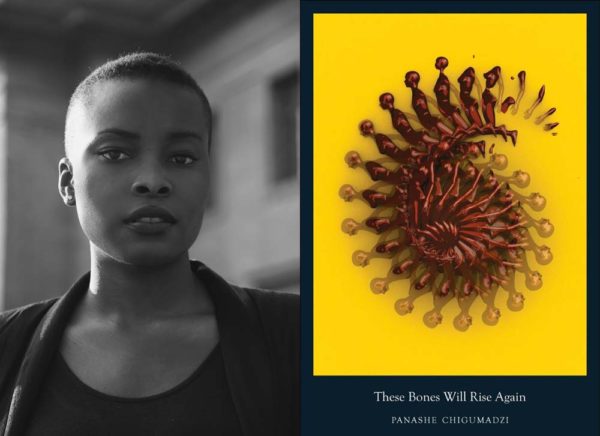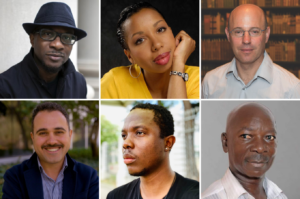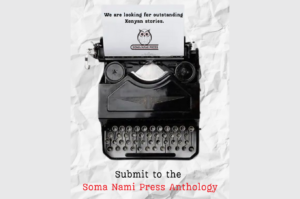
Zimbabwean writer Panashe Chigumadzi has a nonfiction book out. These Bones Will Rise Again “reflects on the November 2017 ousting of Robert Mugabe, radically reframing the history of Zimbabwe to include the perspectives of workers, women and urban movements.” It combines reportage, memoir and critical analysis to interrogate “the coup that was not a coup,” the telling of history and manipulation of time, and “the ancestral spirits of two women – her own grandmother and Mbuya Nehanda, the grandmother of the nation.”
Published by Ellah Allfrey’s The Indigo Press, These Bones Will Rise Again comes with blurbs from Tsitsi Dangarembga (“Chigumadzi’s exploration of personal, family and national history reincarnates in stark, vivid images, many of those interred in the shadows of her country’s ‘Big Men.'”) and Caine Prize winner Brian Chikwava (“Chigumadzi successfully nests the intimate charge of her poignant personal story in the sweeping historical account and mythology of Zimbabwe”).
And following its 14 June release, Chigumadzi has compiled a 13-track playlist, spanning 70 years, that captures the spirit of the book and the Zimbabwean masses’ goal of restoring the legacy of Chimurenga, the liberation struggle. The songs are accompanied by explanations. Here are her chosen songs:
- “Stimela” – Hugh Masekela
- “Khauleza” by Dorothy Masuka
- “Skokiaan” by August Musarurwa
- “Dzoka Uyamwe” (Come Back and Suckle) – Oliver Mtukudzi
- “Mhondoro” (Royal Ancestor Spirit) – Thomas Mapfumo
- “Chachimurenga” (It’s Now a Chimurenga) – Stella Chiweshe
- “Take Cover” – Jairos Jiri Sunrise Kwela Band
- “Mugove” – Leonard Zhakata
- “Dai Ndakadzidza” (If Only I Was Educated) – Simon Chimbetu
- “Murimi Munhu” – Oliver Mtukudzi
- “Disappear” – Winky D
- “Mudhara Vachauya” – Jah Prayzah & The 3rd Generation Band
- “Muchinjiko” (The Cross) – Jah Prayzah & The 3rd Generation Band
On Hugh Masekela’s “Stimela”:
Although it doesn’t appear in the book, I begin with Hugh Masekela’s Stimela because I believe it is a song that sings the soul of Southern Africa’s settler colonies. It sings the story of dispossession, migration and forced labour that destroyed African families and livelihoods in ways we are only really beginning to account for now. I am haunted every time I hear Masekela, whose great grandfather was a Kalanga preacher who came from what is now known as Zimbabwe to evangelise in what is now South Africa, begin his spoken word monologue:
“There is a train that comes from…all the hinterlands of Southern and Central Africa./ This train carries young and old men who are conscripted to come and work on contract/ In the Gold and Mineral mines of Johannesburg and the surrounding provinces and Metropolis/ 16 hours or more a day, for almost no pay./ Deeeeeeep, deeeeeep deeeeep, deeeeeep, deeeeeep, deeeep..”
On Dorothy Masuka’s “Khauleza”:
“Khauleza!”, a phrase shouted in South Africa’s black townships, reservations, whichever, near the cities of South Africa as people see police cars coming to raid their homes for one thing or another. They say “Khawuleza!” which simply means “Hurry! Don’t let them catch you!” The song, later performed by many other artists including Hugh Masekela and Miriam Makeba, was composed by one of our greatest songwriters Dorothy Masuka. Dorothy, the “famous Rhodesian star” was born in 1935 in Bulawayo after a Zambian Lozi chef working on Southern Africa’s white passenger trains met a Zulu nanny tending the children of her white South African employers. Masuka, who moved to Johannesburg in her late teens and went on to be a powerful voice against Southern African settler regimes, once said, “I never held a gun but my voice was as powerful as a gun.”
Read all she has to say about the songs on Africa Writes Website.









Meet 2018 Brittle Paper Awards Winners at Abantu Book Festival | The Journalist July 30, 2022 14:30
[…] and Mohulatsi are at the event to discuss their new books. Chigumadzi’s These Bones Will Rise Again (The Indigo Press, June) combines reportage, memoir and critical analysis to “reflect on the […]